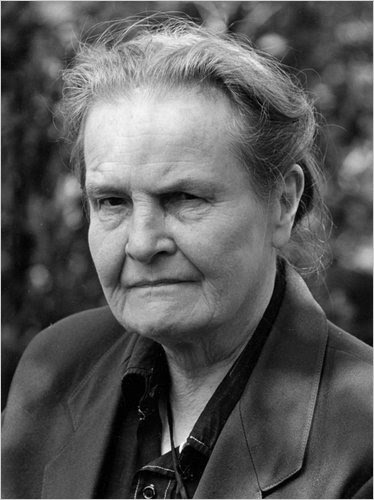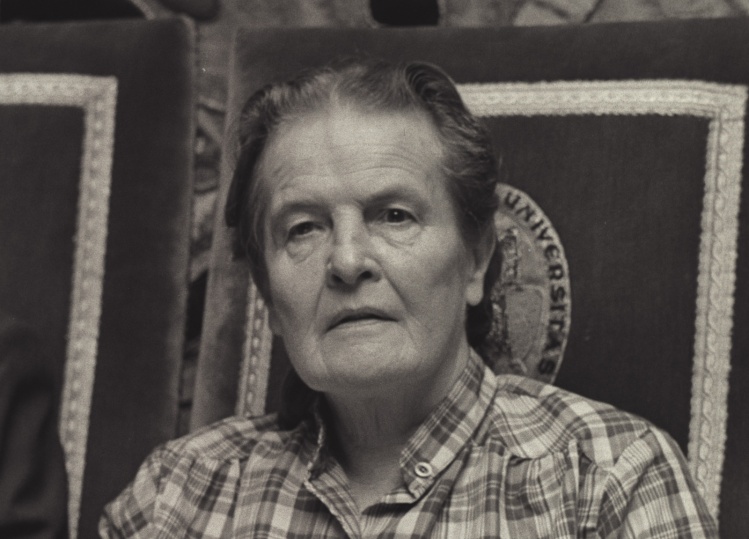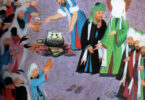The Anscombe Society is a student organization at Princeton University that aims to foster an atmosphere where sex is dignified, respectful, and beautiful; where human relationships are affirming and supportive; where marriage is given pride of place among those relationships; where motherhood and authentic femininity are reverenced; where true masculinity and committed fatherhood are vital to family life; and where no one is objectified, instrumentalized, or demeaned. We hope to provide those students who strive to understand, live, and love their commitment to chastity and ‘traditional’ sexual and familial ethics with the support they need to make their time at Princeton the best it can be. Lastly, we wish to offer these values to the wider Princeton community and promote a culture of charitable dialogue and mutual understanding among all Princetonians.
Gertrude Elizabeth Margaret (G.E.M., or Elizabeth) Anscombe (1919-2001), a student and literary executor of Wittgenstein, was a British analytic philosopher — according to some, the 20th century’s greatest. Her 1957 book Intention, on the role of reasoning in human action, has become a modern classic; her penetrating analysis of traditional sexual ethics in a 1977 essay “Contraception and Chastity” displays the rigor of her moral reasoning and the vigor of her defense of family values. A highly regarded Cambridge professor, wife, and mother of seven, she was chosen as our namesake for her unabashed dedication to the life of the mind and to marriage and family in her life and work.

A. J. Ayer once told her: “If you didn’t talk so slowly, people wouldn’t think you were so profound”. Elizabeth talked slowly in part because she was constantly drawing on cigars, blowing smoke rings like the caterpillar in Wonderland before making a pronouncement. Entering a Cambridge common room, she was bemused to hear some earnest women arguing that nothing in the Bible prevented the ordination of women. Elizabeth calmly leaned against the mantelpiece and recited the names of the Twelve Apostles, and blew a smoke ring at them.
Elizabeth Anscombe was born to Gertrude Elizabeth Anscombe and Alan Wells Anscombe, on arch 18, 1919, in Limerick, Ireland, where her father had been posted as an officer in the British army.
During her first year as an undergraduate, she converted to Roman Catholicism. Elizabeth remained a lifelong devout Catholic. She caused controversy when she opposed Britain’s entry into World War II..
Elizabeth Anscombe was unlike most of her Oxford and Cambridge colleagues in being a staunch Roman Catholic Christian. She scandalized liberal colleagues with articles defending the Roman Catholic Church’s opposition to contraception in the 1960s and early 1970s. She also denounced homosexuality. Later in life, she was arrested twice while protesting outside an abortion clinic in the UK.
She would face fierce public controversy in the defence of her Catholic faith. In 1956, while a research fellow at Oxford University, she protested against Oxford’s decision to grant an honorary degree to Harry S. Truman, whom she denounced as a mass murderer for his use of atomic bombs at Hiroshima and Nagasaki.
Anscombe was known for being outspoken, often with hints of rudeness. Some would call her the “Dragon Lady.” She could breathe on bread to turn it into toast. She sometimes wore a monocle. She was impatient with pretension and pompousness. She devoted much time to students who she considered to be enthusiatic. Although staunchly Roman Catholic, she was not straight-laiced. At times, she could be seriously foulmouthed.
In Elizabeth’ work we find a clear insistence on truth. This truth becomes a condition for the comprehensions of what makes an action a good action.
She argued in a paper that present-day notions such as “moral obligation”, “moral duty”, “morally right”, and “morally wrong” are things that have followed from held over from the Judaeo-Christian idea of God as a lawgiver. She reasoned that these notions no longer carry that weight. We no longer think that we ought to do things “because we are commanded by God”.
“Those who try to make room for sex as mere casual enjoyment pay the penalty: they become shallow. At any rate the talk that reflects and commends this attitude is always shallow. They dishonour their own bodies; holding cheap what is naturally connected with the origination of human life.”
G. E. M. Anscombe Contraception and Chastity (1975)
Source: https://quotepark.com/authors/g-e-m-anscombe/
„The command to a Christian couple is: “Grow in grace and love together.”“
G. E. M. Anscombe Contraception and Chastity (1975)
Comment:
If a kind of love cannot be commanded, we cannot build our moral theology of marriage on the presumption that it will be present. The absence of love is sad, but this sadness exists and the absence of love is common. It is like the Scout Law: “A Boy Scout is kind to animals” which means “a Boy Scout ought to be kind to animals”. If we hear: “a Christian couple grow in grace and love together” doesn’t the question arise “supposing they don’t?” The command to a Christian couple is: “Grow in grace and love together.” But a joint command can only be jointly obeyed. Suppose it isn’t? Well, there remains the separate precept to each and in an unhappy marriage, one ought still to love the other, even though the affection cannot be commanded. People who are not happily married should have a loyalty to the bond.
Source: https://quotepark.com/authors/g-e-m-anscombe/
„A severe morality holds that intercourse (and may hold this of eating, too) has something wrong about it if it is ever done except explicitly as being required for that preservation of human life which is what makes intercourse a good kind of action. But this involves thoroughly faulty moral psychology. God gave us our physical appetite, and its arousal without our calculation is part of the working of our sort of life. Given moderation and right circumstances, acts prompted by inclination can be taken in a general way to accomplish what makes them good in kind and there’s no need for them to be individually necessary or useful for the end that makes them good kinds of action. Intercourse is a normal part of married life through the whole life of the partners in a marriage and is normally engaged in without any distinct purpose other than to have it, just as such a part of married life.“
G. E. M. Anscombe Contraception and Chastity (1975)
“There is no such thing as a casual, non-significant sexual act; everyone knows this. Contrast sex with eating – you’re strolling along a lane, you see a mushroom on a bank as you pass by, you know about mushrooms, you pick it and you eat it quite casually – sex is never like that. That’s why virtue in connection with eating is basically a matter only of the pattern of one’s eating habits. But virtue in sex – chastity – is not only a matter of such a pattern, that is of its role in a pair of lives. A single sexual action can be bad even without regard to its context, its further intentions and its motives.“
G. E. M. Anscombe Contraception and Chastity (1975)
References:
https://www.newworldencyclopedia.org/entry/G.E.M._Anscombe
- Dolan, John. G.E.M. Anscombe: Living the Truth. First Things: the Journal of Religion, Culture and Public Life (May 2001): 11-13. an obituary or memoir by Professor John Dolan. [1]. Retrieved April 29, 2008.
- O’Grady, Jane.
- The Guardian January 11, 2001, Obituary: Elizabeth Anscombe.[2]. Retrieved April 29, 2008.
- Monk, Ray. (1990/1991). Ludwig Wittgenstein: The Duty of Genius. New York: Penguin Books. ISBN 0140159959.
- Frequently Asked Questions about C.S. Lewis: “Were Lewis’s proofs of the existence of God from Miracles refuted by Elizabeth Anscombe?”
- Teichmann, Jenny. Biographical memoir “Gertrude Elizabeth Margaret Anscombe.” Proceedings of the British Academy 2001. [3]







